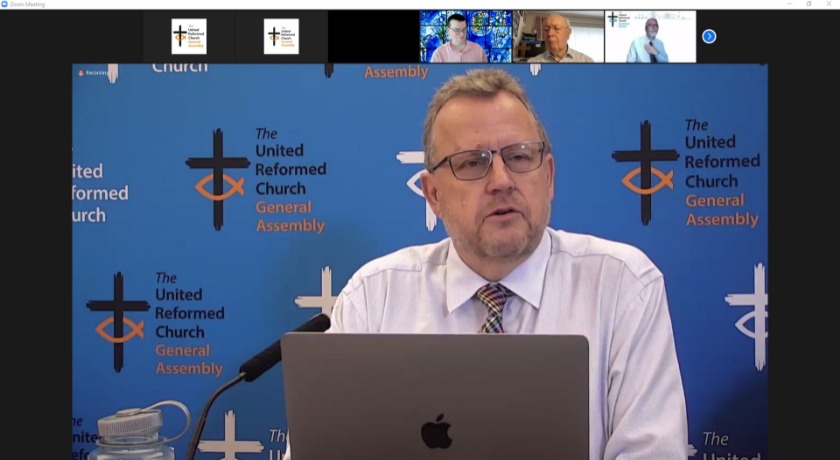The Revd Helen Everard, Chaplain to the Moderators of Assembly, led a short session of worship on the last morning of General Assembly.
The Convenor of the Business Committee, the Revd Adrian Bulley, announced that contributions from members of Assembly would be reduced from three to two minutes, because of the amount of outstanding business to cover in the remaining sessions.
Session thirteen
Liminal times – the Synod Moderators’ Report
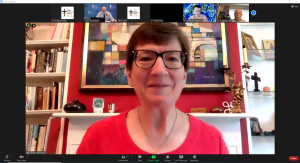 The Revd Ruth Whitehead, Moderator of the South Western Synod, opened the report from the Synod Moderators with a welcome to new members and thanks to those who have moved on.
The Revd Ruth Whitehead, Moderator of the South Western Synod, opened the report from the Synod Moderators with a welcome to new members and thanks to those who have moved on.
The Moderators asked: ‘where are we?’
“We are in decline as a denomination and we know we are not alone in that sense that our numbers are falling and our structures are creaking,” Ruth said.
“We are still in the midst of a global pandemic which has brought even more rapid change to so many aspects of life and has brought havoc and tragedy to many people. So as the traditional funeral service words say: ‘in the midst of life we are in death’.” These are liminal times – between times.
Ms Whitehead shared Richard Rohr’s description of liminal space: “…a unique position where human beings hate to be but where the biblical God is always leading them … It is when you are between your old comfort zone and any possible new answer. If you are not trained in how to entrust and wait, you will run…anything to flee this terrible cloud of unknowing.”
Liminal times are like a threshold, as the Church moves from one state to another, it recognises the change and pauses in the space. Or we can describe liminal times as like being in the fog – we can’t see clearly where to go.
“This is not the time to panic, or put the headlights on full beam, or slam our foot to the floor and hope for the best,” Ms Whitehead continued.
“Liminal times are like pupation. Like a caterpillar becoming a butterfly, we know we are changing, and that change is inevitable, but right now it’s hard to see the way forward.”
In liminal times, we need to be prepared to wait; to deepen our communal discernment; shape our institutional memory; clarify our purpose; see the way forward emerge; and how do we do each of these things?
We need to listen for God together in the Bible, prayer and in one another, to tell our story and remember who we were, who we are, and what our deepest guiding values are; to ask who God wants God’s church to be now, as an expression of God’s love for the world.
The URC needs to look for signs of green shoots of new life and new ways, emerging from the chaos.
In the Book of Reports there are examples of people engaging in each of these phases. The Synod Moderators hope local churches and others will explore your own response to liminal times together, perhaps using the questions to help you.
“Our greatest need in these liminal times is to trust God for wisdom.”
Ruth Whitehead returned to the funeral service and words from Deuteronomy: “The eternal God is your dwelling place and underneath are the everlasting arms”.
The Revd Dr Catherine Ball welcomed the report and signs of hope mentioned in the report, as did the Revd Naomi Young-Rodas who asked the church to stop talking about decline and start focussing on the green shoots.
The Revd Sam White, Principal of Westminster College, Cambridge, hoped that the work of the Resource Centres for Learning would continue to be part of the means to discern the new ethos of the church, and that the Moderators and their work remained in the thoughts and prayers of the Church.
John Piper echoed this and for the care of the Moderators had given over the past 18 months.
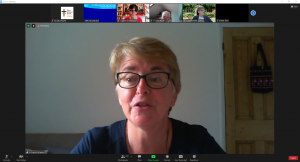 Paper I4: the future of Walking the Way: Living the life of Jesus today
Paper I4: the future of Walking the Way: Living the life of Jesus today
The future of Walking the Way: Living the life of Jesus today (Paper I4)
Francis Brienen, Deputy General Secretary (Mission), presented this paper to Assembly, on behalf of the Walking the Way Steering Group. Walking the Way is a focus on whole-life discipleship that the United Reformed Church has pursued in recent years. The resolution proposes to bring the work of the steering group to a conclusion at the end of 2022, and extend the post of Walking the Way Project Manager for a year until then.
Members of the Assembly expressed enthusiasm for the emphasis on whole life discipleship that Walking the Way has advocated, and discussed whether the present proposals were best way to facilitate it.
The Assembly agreed to an amendment in paragraph E of the resolution, changing ‘resources’ to ‘resources and relationships’.
The amended resolution was passed.
Session fourteen
Nominations
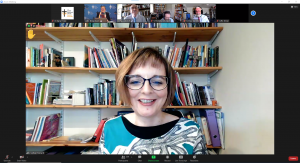 Paper J2: Eastern Synod Moderator
Paper J2: Eastern Synod Moderator
General Assembly appointed the Revd Lythan Nevard, a United Reformed Church minister (URC) currently serving at the Cornerstone ecumenical project in Cranbrook, Exeter, and previously a minister in Hartlepool, Romford, Brixham and Babbacombe, to serve as the next Moderator of Eastern Synod until 2028.
The nomination follows the move by the Revd Paul Whittle to serve as Moderator of the URC National Synod of Scotland.
Lythan was a member of the URC’s Ginger Group in the 1980s, a group of young people that visited churches around the country, leading a variety of church related projects, based at Yardley Hastings.
Lythan grew up in the United Reformed Church – her father is the Revd Ivor Rees, a URC minister who served at Clapham, Ewell, Swansea and Bamford.
Her husband, the Revd Phil Nevard, is a URC Minister currently serving Kingsteignton and the South Western Synod who has accepted a call to serve three churches in the Eastern Synod – Castle Camps, Whittlesford and Sawston. Lythan and Phil met while serving together on the Ginger Group.
On the announcement of her nomination, Lythan said: “The Holy Spirit has led me on many adventures, and I am both delighted and awed that the next one is as Moderator of Eastern Synod. I’m really looking forward to working with the churches and Ministers of the Synod and finding out how we can grow in discipleship and serve God’s kingdom together.”
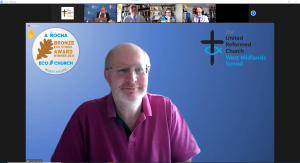 Paper J4: West Midlands Synod Moderator
Paper J4: West Midlands Synod Moderator
General Assembly appointed the Revd Steve Faber, to extend his role of Moderator of the West Midlands Synod. Steve’s second term will run from 1 September 2022 to 31 August 2027.
Steve began the role of West Midlands Synod Moderator in September 2015, and has been praised for his leadership through a period of transition in the region, his commitment to pastoral presence within the churches of the Synod and appreciation of his work providing guidance for the whole church during the Covid 19 pandemic.
In March, the Synod became the first in the denomination to achieve the A Rocha Bronze Eco Synod award.
The Revd Clare Downing, Moderator of the General Assembly, thanked Steve for leading the URC’s advice to churches on the Covid-19 pandemic.
Mission Council – Appendix Two: A Minister for Digital Worship post
This paper was originally introduced to General Assembly by the Revd Dr John Bradbury in session nine but was remaindered to session 14 following lively discussions.
The paper focuses on making the Daily Devotions and Daily Devotions Sunday service an integral part of the life of the URC. The Devotions began as a personal initiative of the Revd Andy Braunston and now reaches around 4,000 people daily. Around 1,500 access the Daily Devotions Sunday Service, which started as a result of people not being able to access local church services during the pandemic.
However, Andy has a full-time ministry around which he fits the work of the Daily Devotions and it is becoming increasingly hard for him to do so, despite receiving help from Dan Morrell who has been providing Andy with temporary support.
The position would be full-time, for a term of seven years, and based at Church House so that support can be received from the Communications Team.
Points of discussions included whether the post could not be limited to an ordained Minister and whether it could be a offered on a part-time basis; whether the contract term could be three years not seven.
John advised because sacramental worship was at the heart of the ministry, it was appropriate for the post to be for a Minister of Word and Sacrament, and offering the role on a part-time basis would mean that that existing digital ministries such as the Daily Devotions would simply continue to as is, rather than develop and grow further.
Concerns were also raised about the exclusion of other digital ministries that have flourished during the pandemic such as Churspacious which provides worship, discipleship, Bible study, and pastoral care.
The General Secretary also committed to having further discussions about finding a way through for other existing digital ministries, such as Churspacious, so concerns and hopes could be fully heard and to see what could possibly be done so that it has life beyond the next 10 months. To aid these discussions and explorations of the person appointed to the post, a proposal was made which was named resolution 3b which read:
General Assembly also directs the General Secretariat to explore the creation of a role within the United Reformed Church that most effectively embraces:
1. The development of hybrid church
2. The incorporation of online congregations into our church structure
3. Maximising the opportunities afforded by virtual forms of church for mission, outreach, evangelism and the development of discipleship.
Other suggestions were made that the post be for three years instead of seven, and what was now called resolution 3a and 3b be not put for further work to be made, and that the resolutions be divided into two separate posts, however votes on these proposals were not carried and the resolutions, 3a, 3b and 4, originally written following amendments were carried.
Session fifteen
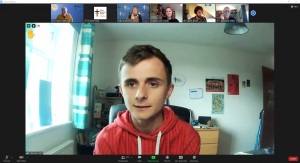 Paper B2: URC committees and online meeting
Paper B2: URC committees and online meeting
Discussions resumed regarding Resolution 12, after resolutions 10 and 11 were passed in session 12 of the Assembly. The resolution was carried.
General Secretary’s Report on Disciplinary Cases
The Revd Dr John Bradbury, as required under the Process for Ministerial Discipline, reported to report General Assembly on cases that have been brought to completion since the Assembly last met. He advised that two Section O cases had been completed since Assembly met in 2020, which had incurred costs totalling just under £26,000. One minister was deleted from the roll of ministers.
The Revd Helen Everard then said a prayer for all those involved with the disciplinary process.
Moderator-elect acceptance speech
Address to the throne
The Address to the Throne was adopted by the General Assembly. The text is available on the General Assembly papers page of the URC website.
Closing worship
General Assembly concluded with worship led by the Revd Helen Everard. The Revd Paul Robinson led Assembly in the hymn ‘Sing of the Lord’s Goodness’.
The Revd Paul Holmes, a hospital chaplain in Coventry, led the Bible Study on the story in Luke 8 of a woman being healed by touching the hem of Jesus’s robe. The reading was presented by young people in a video.
Mr Holmes said that the story illustrated the work of a chaplain, and indeed any kind of ministerial work. It is a story of the restoration of physical and mental health, of hope, and the fulfilment of a person’s potential. This happened, he said, because the woman’s relationship with God enabled her to touch Jesus. Relationships should be at the heart of what we do – relationships with Christ, with members of our congregation, with our synods. Are these relationships of ours healthy?
This is also a story of presence, said Mr Holmes. The woman went and touched Jesus because he was present. We have to be present so people can come to us. We have to be seen.
Mr Holmes ended with a challenge: ‘This lady is a real heroine because she was prepared to fall at the feet of Jesus, knowing she needed help. Are we prepared to do that?’
Worship concluded with reflections from young people on the theme of coming close to God, and with the song ‘All Through History’ led by Woking URC band.
Induction of the Deputy General Secretary (Discipleship)
Mr Peter Pay led the induction of the Revd Adrian Bulley into the role of URC Deputy General Secretary (Discipleship), saying God gives a variety of gifts and calls each of us to serve according to those gifts and the needs of the world.
The Revd Adrian Bulley then took to the stage and expressed his surprise at the sequence of events, after believing his life had been “pretty well mapped out”.
But what started as a request for help began to feel to him as a calling.
“As is so often the case, God had other plans for me. Somewhat different plans to those which Ann [his wife] and I thought we’d made,” he said. “And so I find myself on the cusp of new challenges, new relationships, new responsibilities, new experiences, trusting that the God who has been with me thus far through life, even when I didn’t know it at the time, and who has brought me to this point, will support and equip me going forward.
“That’s discipleship. Stepping, striding, stumbling forward in faith. Following where God leads, learning and growing as we travel.
“May God bless me and us all as we step forward together.”
The Statement concerning the Nature, Faith and Order of the URC was then read.
At the direction of the General Assembly Moderators, Adrian affirmed his faith and commitment to his new role and promises were then made by General Assembly which confessed faith in one God: Father, Son and Holy Spirit, to receive Adrian into his ministry and to pray for, encourage and support him.
Peter then declared Adrian to be inducted into the role and Clare led a prayer for him, at the end adding: “It is good to know that some of those areas of the life of the Church which need oversight will have you as a safe pair of hands holding on to them.”
On behalf of Francis Brienen (Mission), Jane Baird (Admin and Resources), and himself, the Revd Dr John Bradbury welcomed Adrian to the General Secretariat and called him a great blessing to the team.
Reporting by Andy Jackson, Ann-Marie Nye, Steve Tomkins

